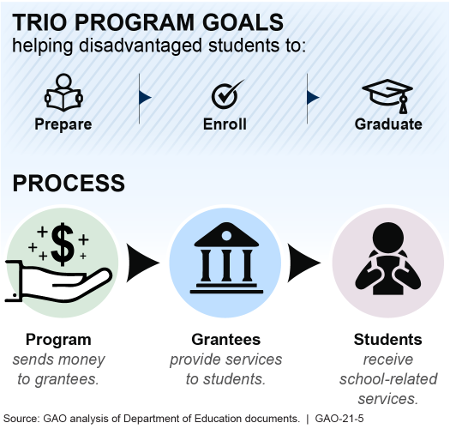Higher Education: Department of Education Should Further Assess College Access Grant Programs
Fast Facts
The Department of Education gives grants to schools and organizations to help disadvantaged students prepare for, enroll in, and graduate from college. These eight grant programs are collectively known as “TRIO”—named for the three original programs.
Congress provides over $1 billion annually to TRIO programs and Education could do more to understand how well these grants work to help students enroll in and complete college. For example, studies of some programs are outdated and Education never assessed 3 of the current TRIO programs.
Our recommendations include developing a plan to assess TRIO's effectiveness.

Highlights
Why This Matters
The Department of Education gives grants to schools and organizations that provide disadvantaged students with services to help them attend college. These eight grant programs are collectively known as “TRIO”, named for the original three programs.
Congress provides over $1 billion each year to these programs, but Education could do more to understand how well these grants work to help students.
Key Takeaways
Education could improve the information it has about TRIO programs in two areas: (1) grantee performance data, and (2) program assessments.
Schools and organizations report data to Education to show how the TRIO grants they receive have been working. For example, organizations that receive grants to encourage students to complete college report on the numbers and percentages of students who received services and earned degrees.
Education evaluates grantees’ performance using the self-reported data, but has done little to verify the data. Accurate performance data are important because returning grantees can earn points for past performance in the next grant competition—increasing the likelihood that they will receive new grants. Almost 80 percent of recent TRIO grants went to returning grantees.
Therefore, grantees may have an incentive to report a more positive picture than warranted. Officials from an organization representing TRIO grantees told us there is a risk that some grantees may report inaccurate information.
As for assessing the individual TRIO programs, studies of some programs are outdated. In addition, Education has never assessed the effectiveness of three of the seven TRIO programs that serve students, and did not have any new assessments planned as of August 2020.

How GAO Did This Study
We analyzed data from Education about TRIO grantees and applicants. We also reviewed relevant federal laws and regulations and agency documents, and interviewed Education officials and other TRIO stakeholders.
Recommendations
Education should take additional steps to ensure the reliability of grantees' performance data and develop a plan for assessing the effectiveness of the TRIO programs that serve students. Education generally agreed with our recommendations.
Recommendations for Executive Action
| Agency Affected | Recommendation | Status |
|---|---|---|
| Department of Education | The Assistant Secretary for the Office of Postsecondary Education should take additional steps to ensure the performance data TRIO grantees report are reliable. (Recommendation 1) |
Education partially concurred with this recommendation. Education agreed that this information is important and the department has an interest in improving its reliability, noting steps it could take to better monitor the reliability of the different types of performance data grantees submit. However, Education noted that it does not have access to underlying data sources that can independently verify certain data that grantees in some programs are required to submit, such as high school persistence, rigorous course enrollment, exposure to research opportunities, student grade point average, and secondary school completion. In July 2021, Education officials reported that the department has student-level data it can use to assess the reliability of reported outcome data for a number of TRIO programs, and that these programs comprise 79 percent of TRIO grants. For these programs, Education plans to access internal and other external data to better understand the reliability of reports submitted by TRIO grantees on postsecondary enrollment, persistence, and degree attainment. For programs that lack supplemental sources of data, Education is considering asking grantees how they compiled student-level data and identifying other statistically appropriate methods for verifying performance data including potentially conducting monitoring of TRIO grantees' programs. Prioritizing staff resources toward oversight and monitoring is an essential component of program administration, particularly for programs like TRIO that rely on the results of prior performance to award future grants. In August 2025, Education reported that it continues to implement this recommendation. We await the completion of these efforts to ensure the reliability of TRIO grantee performance data.
|
| Department of Education | The Assistant Secretary for the Office of Postsecondary Education should develop a plan—with specific actions and milestone dates—for assessing the effectiveness of TRIO programs that serve students using methods that are consistent with its statutory authority. (Recommendation 2) |
Education agreed with this recommendation. The department reported in July 2021 that it plans to evaluate TRIO programs using the most rigorous methods available given statutory limitations and will develop a plan with specific actions and milestone dates. Education also noted that it is mindful of the statutory limitations of the HEA, under which Education cannot require grantees to participate in an evaluation that requires TRIO grantees to recruit additional students beyond those the TRIO program or project would normally recruit or that results in the denial of services for an eligible student under the program or project. Education instead plans to choose from among the next most rigorous methods available, while clearly stating the limitations of conclusions based on these methods. In August 2025, the agency reported that it will complete its efforts when the other recommendations have been implemented.
|
